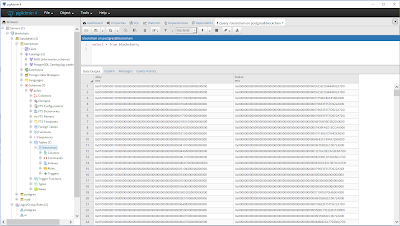Understanding the postgres environment
Postgresql universally have 2 distinct parts. The binary and the data directory. The binary part contains Postgresql executable and the data contains the all the database (tables, indexes, pg_toasts and etc), transaction logs (WALs), postgresql.conf, indent (security).
The following are showing where the binary and data resides and the essential Postgres services.
Note: the binary and the data directories are highly custimizable. Different postgresql vendors may decide there get installed and reside. What's shown here is not a definitely path.
-bash-4.1$ ps -ef|egrep postgres
avahi 1791 1 0 Mar14 ? 00:00:00 avahi-daemon: running [postgres6ec-001.local]
postgres 2065 1 0 Mar14 ? 00:00:25 /usr/pgsql-9.2/bin/postmaster -p 5432 -D /var/lib/pgsql/9.2/data
postgres 2067 2065 0 Mar14 ? 00:00:00 postgres: logger process
postgres 2069 2065 0 Mar14 ? 00:00:00 postgres: checkpointer process
postgres 2070 2065 0 Mar14 ? 00:00:08 postgres: writer process
postgres 2071 2065 0 Mar14 ? 00:00:08 postgres: wal writer process
postgres 2072 2065 0 Mar14 ? 00:00:35 postgres: autovacuum launcher process
postgres 2073 2065 0 Mar14 ? 00:01:15 postgres: stats collector process
Creating basic database for testing. Roles and constraints are all omitted in this test.
-bash-4.1$ psql
psql (9.3.5, server 9.2.9)
Type "help" for help.
postgres=# create database blockchain;
CREATE DATABASE
postgres=#
Listing the database
postgres=# \l
List of databases
Name | Owner | Encoding | Collate | Ctype | Access privileges
------------+----------+----------+-------------+-------------+-----------------------
blockchain | postgres | UTF8 | en_US.UTF-8 | en_US.UTF-8 |
postgres | postgres | UTF8 | en_US.UTF-8 | en_US.UTF-8 |
template0 | postgres | UTF8 | en_US.UTF-8 | en_US.UTF-8 | =c/postgres +
| | | | | postgres=CTc/postgres
template1 | postgres | UTF8 | en_US.UTF-8 | en_US.UTF-8 | =c/postgres +
| | | | | postgres=CTc/postgres
vcdb | postgres | UTF8 | en_US.UTF-8 | en_US.UTF-8 | =Tc/postgres +
| | | | | postgres=CTc/postgres+
| | | | | vc=CTc/postgres
(5 rows)
postgres=#
You are now connected to database "blockchain" as user "postgres".
blockchain=# \d+
No relations found.
blockchain=#
Check current connection user and db.
blockchain=# select current_user, current_database();
current_user | current_database
--------------+------------------
postgres | blockchain
(1 row)
or
blockchain-# \conninfo
You are connected to database "blockchain" as user "postgres" via socket in "/tmp" at port "5432".
--note: column data type char(250) will not be large enough. Have to use text.
create table blockchain (
akey text,
bvalue text
);
CREATE TABLE
Making sure the dump file exist in the correct path.
blockchain-# \! pwd; ls
/var/lib/pgsql/blockchain
blocktest.txt data_output data_output.txt
blockchain=# \d blockchain
Table "public.blockchain"
Column | Type | Modifiers
--------+------+-----------
key | text |
bvalue | text |
blockchain=# COPY blockchain FROM '/var/lib/pgsql/blockchain/data_output.txt' (DELIMITER(':'));
COPY 9493
blockchain=# select count(*) from blockchain;
count
-------
9493
(1 row)
\pset columns 250
\pset format wrapped
Viewing with Pg_Admin 4


No comments:
Post a Comment